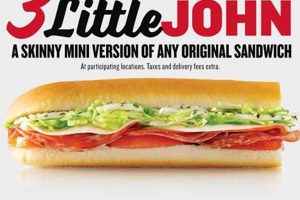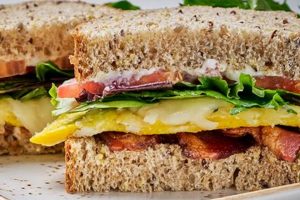Plant-based choices at Jamba Juice provide alternatives for individuals adhering to vegan dietary practices. These selections typically exclude animal products, focusing instead on fruit, vegetables, plant-based milk substitutes, and other non-animal-derived ingredients. An example includes smoothies crafted with almond or oat milk and composed of a variety of fruits and leafy greens.
The availability of menu items catering to specific dietary needs is increasingly relevant as consumer awareness of health and ethical considerations grows. These selections can offer potential health benefits through increased fruit and vegetable consumption. Historically, beverage companies have gradually expanded their offerings to accommodate evolving consumer preferences and dietary restrictions.
The following sections will examine the specific ingredients and available preparations that constitute these plant-based selections, along with considerations for potential modifications to existing menu items to ensure adherence to vegan principles.
This section provides guidance for identifying suitable menu items for those seeking plant-based options. Careful evaluation of ingredients and potential modifications are crucial.
Tip 1: Review Ingredient Lists. Always consult the detailed ingredient information provided in-store or online. This will help confirm the absence of animal-derived ingredients such as honey, dairy, or whey protein.
Tip 2: Opt for Plant-Based Milk Alternatives. Request almond, soy, or oat milk in place of dairy-based milk in smoothies and other blended beverages.
Tip 3: Be Mindful of Added Boosts. Many add-ins contain animal products. Inquire about the composition of protein boosts, energy boosts, and other enhancements to ensure compatibility with plant-based preferences.
Tip 4: Customize Your Order. Don’t hesitate to request modifications to existing menu items. This might involve omitting ingredients like yogurt or substituting non-dairy alternatives.
Tip 5: Verify Sorbet Composition. Confirm that any sorbet used is free from animal-derived gelatin or other non-vegan ingredients. Fruit sorbets are generally a safe selection.
Tip 6: Inquire About Cross-Contamination. Understand the potential for cross-contamination during preparation if equipment is shared with non-plant-based items.
Tip 7: Check for Hidden Ingredients. Be aware that seemingly innocuous ingredients, such as certain stabilizers or emulsifiers, might be animal-derived. Research or ask staff for clarification when necessary.
Adherence to these guidelines ensures greater confidence in the selection of plant-based choices. Awareness of ingredients and proactive communication with staff are essential.
The following section will address specific examples of plant-based-friendly menu items and potential modifications to consider.
1. Plant-based milk availability
Plant-based milk availability is a foundational element in the provision of suitable menu items for individuals seeking vegan choices. The presence of viable non-dairy alternatives directly determines the extent to which standard Jamba Juice offerings can be adapted to meet vegan dietary requirements.
- Smoothie Base Modification
The primary role of plant-based milks is to serve as a direct replacement for dairy milk in smoothies. Without access to almond, soy, oat, or other plant-derived milks, many smoothie recipes would inherently be unsuitable for vegan consumers. For example, a “Strawberry Whirl” smoothie can be rendered plant-based simply by substituting the dairy milk with almond milk.
- Beverage Versatility Expansion
Beyond smoothies, plant-based milks enable the creation of a wider range of vegan-friendly beverages. Lattes, blended drinks, and even certain juice combinations can benefit from the creamy texture and flavor profiles that these alternatives provide. This expands the selection of compliant choices.
- Impact on Nutritional Profile
The substitution of dairy with plant-based milks inevitably alters the nutritional composition of the final product. This includes changes in fat content, protein levels, and the presence of certain vitamins and minerals. While this may not always be a concern, consumers often consider these differences when making dietary choices. A smoothie made with almond milk, for instance, will have a lower calorie count than one made with whole milk.
- Cross-Contamination Risk Mitigation
Dedicated blending equipment or thorough cleaning protocols are crucial when handling both dairy and plant-based milks. Even with the availability of suitable alternatives, cross-contamination can compromise the vegan status of a beverage. Implementing strategies to avoid cross-contamination ensures the integrity of these plant-based options.
In summation, the availability of plant-based milks at Jamba Juice is directly proportional to the accessibility and variety of menu items suitable for a vegan diet. The ability to easily modify core offerings through these substitutions is paramount to effectively catering to this dietary segment.
2. Ingredient list verification
Ingredient list verification is a critical process for individuals seeking plant-based items at Jamba Juice. The accurate assessment of ingredients is essential to confirming the suitability of menu items for vegan dietary preferences and avoiding the inadvertent consumption of animal-derived products.
- Identifying Hidden Animal Products
Many processed ingredients contain hidden animal-derived components. Emulsifiers, stabilizers, and certain flavorings can be sourced from animal products. Ingredient list verification allows consumers to identify these otherwise inconspicuous non-vegan components, such as gelatin in certain sorbets or whey protein in protein boosts.
- Assessing Plant-Based Milk Substitutes
While plant-based milk alternatives like almond, soy, or oat milk are generally vegan, their respective ingredient lists should still be verified. Some commercially available plant-based milks contain additives or flavorings that may not align with strict vegan principles. For instance, some may include honey or dairy-derived thickening agents.
- Understanding Cross-Contamination Risks
Ingredient lists can indirectly provide information about potential cross-contamination risks. For example, if a smoothie ingredient is produced in a facility that also processes dairy, the ingredient list may include an advisory statement. This allows informed decisions regarding potential allergen or ingredient contamination.
- Enabling Informed Customization
The ability to customize menu items, such as removing or substituting ingredients, relies heavily on accurate ingredient list verification. Knowing the complete list of components allows consumers to make informed requests for modifications to ensure compliance with their plant-based dietary needs, such as omitting yogurt or honey.
In conclusion, ingredient list verification is indispensable for ensuring that Jamba Juice selections align with plant-based dietary requirements. It provides the necessary information to identify hidden animal products, assess plant-based substitutes, understand cross-contamination risks, and enable informed customization, contributing to a more reliable and transparent experience for the vegan consumer.
3. Boosts composition scrutiny
The careful evaluation of boost ingredients is paramount in determining the suitability of Jamba Juice offerings for individuals adhering to a vegan diet. These concentrated additives, often included to enhance nutritional value or flavor, frequently contain hidden animal-derived products that are incompatible with vegan principles.
- Identification of Non-Vegan Ingredients
Many common boost ingredients incorporate animal-based products, such as whey protein, derived from dairy, or honey, a product of bee activity. Detailed scrutiny of the ingredient list is required to identify these substances and avoid their consumption. For example, a “Protein Boost” might contain whey protein, rendering it unsuitable for vegans.
- Detection of Modified or Processed Ingredients
Even seemingly innocuous boost ingredients can undergo processing that introduces animal-derived components. For instance, certain vitamin supplements might be encapsulated in gelatin, a substance derived from animal collagen. Scrutiny extends to understanding the processing methods and sources of all boost ingredients.
- Assessment of Cross-Contamination Risks
While a boost ingredient might not inherently contain animal products, it could be manufactured in a facility that also processes such materials. This presents a risk of cross-contamination, potentially introducing trace amounts of non-vegan substances. Careful examination of product labeling and manufacturer information is necessary to assess this risk.
- Facilitation of Informed Consumer Choices
Thorough scrutiny of boost compositions enables consumers to make informed decisions aligned with their dietary requirements. By understanding the ingredients, processing methods, and potential risks associated with each boost, individuals can confidently select options that adhere to vegan principles or request modifications as necessary.
The diligence applied to evaluating boost compositions directly impacts the ability to confidently navigate the menu at Jamba Juice and maintain a commitment to plant-based dietary choices. A comprehensive understanding of boost ingredients empowers consumers to make informed choices and avoid unintended consumption of animal products.
4. Customization possibilities
The capacity to modify menu items significantly influences the accessibility and variety of plant-based selections at Jamba Juice. Customization allows for adaptation of existing offerings to align with vegan dietary requirements, thereby expanding options for consumers adhering to such restrictions.
- Dairy Milk Substitution
A primary customization involves replacing dairy milk with plant-based alternatives, such as almond, soy, or oat milk. This modification renders numerous smoothie recipes suitable for vegan consumption. For instance, a customer can request almond milk in place of dairy milk in a “Strawberry Surf Rider” smoothie, effectively transforming it into a plant-based option.
- Ingredient Omission
Customization also entails the removal of non-vegan ingredients from pre-existing menu items. This can include omitting yogurt, honey, or whey protein boosts. For example, a customer could order a “Peanut Butter Moo’d” smoothie without the dairy-based frozen yogurt, relying solely on the plant-based ingredients and non-dairy milk for the desired consistency and flavor profile.
- Boost Selection Control
Customers have the option to select specific boosts that align with their dietary preferences. This allows them to avoid non-vegan boosts containing whey protein or other animal-derived components. Opting for plant-based boosts, such as flaxseed or chia seeds, ensures the final product remains compliant with vegan standards.
- Sorbet Composition Management
Modifying orders to include only sorbets confirmed to be free of animal-derived gelatin is another facet of customization. Requesting fruit-based sorbets avoids the potential inclusion of gelatin used as a stabilizing agent in some commercially produced sorbets. This ensures the beverage remains entirely plant-based.
These customization possibilities directly correlate with the breadth of viable plant-based choices at Jamba Juice. The ability to modify recipes by substituting ingredients, omitting non-vegan components, and selecting appropriate boosts and sorbets significantly enhances the availability of options suitable for individuals adhering to vegan dietary principles.
5. Sorbet ingredients validation
The suitability of Jamba Juice offerings for vegan consumers is directly contingent upon rigorous sorbet ingredients validation. The presence of gelatin, an animal-derived protein commonly utilized as a stabilizing agent in commercially produced sorbets, poses a significant impediment to the vegan status of beverages containing this component. Therefore, confirming the absence of gelatin becomes a critical step in ascertaining the plant-based integrity of these menu items. For instance, a “Rainbow Sherbet Freeze” would be unsuitable if the sherbet contained gelatin, necessitating that customers verify the ingredient list or inquire with staff to ensure compliance with vegan dietary requirements.
The practical significance of this validation extends beyond mere ingredient identification. It necessitates a proactive approach to transparency, potentially requiring Jamba Juice to clearly label sorbet varieties devoid of animal products. Furthermore, operational procedures may need adjustment to prevent cross-contamination during preparation, especially if both gelatin-containing and gelatin-free sorbets are handled within the same facility. Failure to validate sorbet ingredients can inadvertently mislead vegan customers, potentially resulting in the unintended consumption of animal products and undermining trust in the company’s commitment to accurate dietary labeling.
In summary, sorbet ingredients validation is not merely a peripheral consideration but rather a fundamental prerequisite for ensuring that Jamba Juice can reliably offer genuinely plant-based options. The challenge lies in maintaining consistent verification practices, providing transparent labeling, and implementing operational safeguards to prevent both the inclusion of animal products and the risk of cross-contamination, thereby building consumer confidence in the authenticity of vegan menu offerings.
6. Cross-contamination potential
The potential for cross-contamination represents a significant concern regarding the integrity of plant-based choices at Jamba Juice. It underscores the importance of understanding how shared equipment and preparation surfaces can compromise the vegan status of menu items, even when those items are inherently comprised of plant-derived ingredients.
- Shared Blending Equipment
The use of the same blenders for both vegan and non-vegan beverages introduces the risk of residue transfer. Dairy-based ingredients, honey, or other animal products can remain on blender blades or within the blending container, subsequently contaminating plant-based smoothies prepared afterward. Thorough cleaning protocols are essential to mitigate this risk, but complete elimination of cross-contamination is often challenging. The lack of dedicated equipment may inadvertently expose vegan customers to trace amounts of animal products.
- Common Preparation Surfaces
Preparation areas used for assembling various ingredients can also become sources of cross-contamination. If the same countertops or cutting boards are used for both vegan and non-vegan components, residue transfer can occur. This is particularly relevant for toppings, boosts, and other add-ins. Maintaining separate preparation zones or implementing rigorous cleaning procedures between uses can help minimize this contamination risk, yet reliance on stringent adherence to these practices is necessary.
- Ice and Ingredient Storage
Shared ice bins and ingredient storage containers pose another pathway for cross-contamination. If non-vegan ingredients are stored alongside or above vegan ingredients, accidental spillage or airborne particles can lead to contamination. Implementing distinct storage protocols, such as utilizing separate containers and designated areas, minimizes the potential for such occurrences. However, vigilance in adhering to these protocols remains critical.
- Employee Practices and Handling
Employee handling practices contribute significantly to the risk of cross-contamination. If employees use the same utensils, gloves, or hands to handle both vegan and non-vegan ingredients without proper washing or changing, contamination can readily occur. Training and consistent enforcement of hygiene protocols, including frequent handwashing and glove changes, are crucial to minimize this risk. Lack of proper training can lead to unintentional introduction of animal products into plant-based beverages.
In conclusion, the potential for cross-contamination necessitates heightened awareness and stringent operational procedures within Jamba Juice to ensure the integrity of its plant-based options. Reliance on careful handling, thorough cleaning, and segregated preparation areas is essential for providing reliably vegan choices and maintaining consumer trust.
7. Hidden ingredients awareness
The adherence to vegan dietary principles requires meticulous attention to detail, particularly concerning ingredients not immediately apparent or readily identifiable as animal-derived. This heightened “Hidden ingredients awareness” is critical in the context of ensuring “jamba juice vegan options” truly align with plant-based standards.
- Emulsifiers and Stabilizers
Many processed ingredients incorporate emulsifiers or stabilizers to enhance texture or shelf life. These additives, such as gelatin, derived from animal collagen, or certain lecithin varieties, may be present in seemingly vegan-friendly components. “Hidden ingredients awareness” necessitates careful scrutiny of ingredient lists to identify and avoid these concealed animal products in smoothies and other Jamba Juice offerings. For example, carrageenan, a common stabilizer, while plant-derived, has raised concerns for some consumers.
- Natural and Artificial Flavorings
Flavorings, both natural and artificial, can sometimes contain animal-derived substances or be processed using animal products. For example, a seemingly innocuous “natural strawberry flavoring” could potentially utilize a carrier derived from dairy or other animal sources. “Hidden ingredients awareness” requires consumers to investigate the precise composition and sourcing of flavorings to ascertain their suitability for vegan diets when evaluating “jamba juice vegan options.”
- Refined Sugar Processing
The process of refining sugar may involve the use of bone char, a substance derived from animal bones, to decolorize the sugar. While the final product does not contain bone char, its use in the refining process renders the sugar non-vegan for some individuals. “Hidden ingredients awareness” necessitates an understanding of sugar refining methods and potentially seeking out certified vegan sugar or alternative sweeteners when selecting “jamba juice vegan options.”
- Glazes and Coatings
Certain glazes or coatings applied to toppings or other add-ins may contain animal-derived ingredients, such as beeswax or shellac. These seemingly minor components can compromise the vegan status of an otherwise plant-based beverage. “Hidden ingredients awareness” mandates a thorough examination of the ingredients used in all components of “jamba juice vegan options,” including seemingly insignificant additions.
The interplay between these facets of “Hidden ingredients awareness” and the selection of “jamba juice vegan options” highlights the necessity for diligent investigation and a commitment to transparency. Understanding potential sources of hidden animal products empowers consumers to make informed choices and ensures that their dietary principles are upheld when navigating the Jamba Juice menu.
Frequently Asked Questions
The following section addresses common inquiries regarding the availability and composition of plant-based choices at Jamba Juice.
Question 1: Are all smoothies at Jamba Juice suitable for vegan consumption?
No, not all smoothies inherently meet vegan dietary requirements. Many standard recipes contain dairy milk, yogurt, or honey. Careful review of the ingredient list or direct inquiry with staff is necessary to ascertain the plant-based status of each beverage.
Question 2: What plant-based milk alternatives are available?
Typically, almond milk, soy milk, and oat milk are offered as substitutes for dairy milk. The availability of specific plant-based milk options may vary by location. Confirmation with local stores is advisable.
Question 3: Are the “boosts” offered at Jamba Juice plant-based?
Many boosts contain animal-derived ingredients, such as whey protein or honey. Thorough examination of the ingredient composition is essential to ensure that any added boost aligns with vegan dietary standards.
Question 4: How can one be certain a sorbet is vegan-friendly?
Certain sorbets contain gelatin, an animal-derived protein. Verification of the ingredient list or direct inquiry with staff is required to confirm the absence of gelatin in sorbet-containing menu items.
Question 5: Is cross-contamination a concern when ordering plant-based selections?
The potential for cross-contamination exists due to shared blending equipment and preparation surfaces. Individuals with strict adherence to vegan principles should be aware of this risk and consider inquiring about cleaning protocols or dedicated equipment.
Question 6: What steps can be taken to ensure a Jamba Juice selection is plant-based?
Consulting the ingredient list, requesting plant-based milk alternatives, omitting non-vegan boosts, confirming sorbet composition, and inquiring about cross-contamination protocols are prudent steps in ensuring adherence to vegan dietary requirements when ordering at Jamba Juice.
These questions highlight the importance of informed decision-making and proactive communication when seeking plant-based choices. Awareness of potential pitfalls and a commitment to verification are essential.
The subsequent section will provide a summary of the key principles to consider when navigating plant-based dietary options at Jamba Juice.
Conclusion
The preceding exploration of Jamba Juice vegan options has underscored the necessity for informed consumer engagement and transparent ingredient information. The variability in product composition and preparation practices requires diligent scrutiny to ensure adherence to plant-based dietary requirements. Key considerations include verifying ingredients, understanding potential cross-contamination risks, and leveraging customization possibilities.
While Jamba Juice offers viable selections for individuals seeking plant-based options, maintaining vigilance and engaging in proactive communication with staff remains paramount. The availability and accuracy of dietary information will continue to shape the consumer experience and the accessibility of plant-based choices within the broader food service industry.



![Best Brunch: Vegan Options Near Me [Updated] Discover Delicious Vegan Food, Beauty Swaps, and Zero-Waste Tips for a Greener Life Best Brunch: Vegan Options Near Me [Updated] | Discover Delicious Vegan Food, Beauty Swaps, and Zero-Waste Tips for a Greener Life](https://thisvegangirl.com/wp-content/uploads/2026/03/th-32-300x200.jpg)



